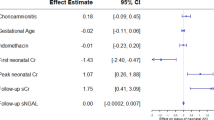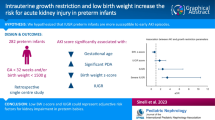Abstract
Since few data are available about factors affecting renal maturation especially in the lower gestational ages (G.A.), the aim of this work was to study postnatal renal function in a representative population sample of preterm newborns (G.A. ≤36 weeks), admitted to the neonatal intensive care units of seven Italian hospitals, in order to investigate a possible role of drugs, therapeutic interventions and diseases. Data were collected through detailed questionnaires including maternal and neonatal information. To test renal function, serum creatinine and urine output were regularly recorded every 3 days throughout the 1st month of life. A total of 246 subjects were enrolled in the study and divided into four groups according to G.A.: group A, 22–25 weeks; group B, 26–28 weeks; group C, 29–32 weeks; group D, 33–36 weeks. Serum creatinine concentrations at birth were similar in all four groups, while significant differences were evident from the 3rd to the 21st day of life. Within each group, two subpopulations were identified taking into account creatinine values. In subjects with serum creatinine concentrations within the normal range, a physiological decline in creatinine values was observed with increasing postnatal age, and an inverse correlation between creatinine and G.A. was evident from the 3rd day of life to the end of the study period. In neonates with impaired renal function, a marked increase in creatinine values was observed in all neonates from the 3rd day of life, with significant differences among groups on days 7 and 10. Whereas many risk factors were correlated (univariate analysis) with impaired renal function, the multivariate analysis identified only five factors as independent: maternal consumption of nonsteroidal anti-inflammatory drugs (NSAIDs) during pregnancy [odds ratio (OR): 7.38, 95% confidence interval (CI) 3.26–16.7] and intubation at birth (OR: 4.39, 95% CI: 1.2–16.3) were the main risk factors. Respiratory distress syndrome, a low Apgar score and ibuprofen treatment of the neonate were identified as additional risk factors. Our data confirm a multifactorial origin of acute renal impairment in newborns. It is of note that pharmacological treatment with NSAIDs during pregnancy may negatively influence neonatal renal function.


Similar content being viewed by others
References
Fanos V, Khoory BJ, Cataldi L (1996) Postischaemic acute renal failure in newborns. Physiopathological aspects and early diagnosis. In: Cataldi L, Fanos V, Simeoni U (eds) Neonatal nephrology in progress. Agorà, Lecce, pp 237–249
Toth-Heyn P, Drukker A, Guignard JP (2000) The stressed neonatal kidney: from pathophysiology to clinical management of neonatal vasomotor nephropathy. Pediatr Nephrol 14:227–239
Drukker A, Guignard JP (2002) Renal aspects of the term and preterm infant: a selective update. Curr Opin Pediatr 14:175–182
Fanos V, Cataldi L (1999) Antibacterial-induced nephrotoxicity in the newborn. Drug Saf 20:245–267
Tommiska V, Heinonen K, Ikonen S, Kero P, Pokela ML, Renlund M, Virtanen M, Fellman V (2001) A national short-term follow-up study of extremely low birth weight infants born in Finland in 1996–1997. Pediatrics 107:e2
Cataldi L, Leone R, Moretti U, De Mitri B, Fanos V, Ruggeri L, Sabatino G, Torcasio F, Zanardo V, Attardo G, Riccobene F, Martano C, Benini D, Cuzzolin L (2005) Potential risk factors for the development of acute renal failure in preterm newborn infants: a case-control study. Arch Dis Child Fetal Neonatal Ed 90:514–519
Sonntag J, Prankel B, Waltz S (1996) Serum creatinine concentration, urinary creatinine excretion and creatinine clearance during the first 9 weeks in preterm infants with a birth weight below 1,500 g. Eur J Pediatr 155:815–819
Gordjani N, Burghard R, Leititis JU, Brandis M (1988) Serum creatinine and creatinine clearance in healthy neonates and prematures during the first 10 days of life. Eur J Pediatr 148:143–145
Siegel SR, Oh W (1976) Renal function as a marker of human fetal maturation. Acta Paediatr Scand 65:481–485
Miall LS, Henderson MJ, Turner AJ, Brownlee KG, Brocklebank JT, Newell SJ, Allgar VL (1999) Plasma creatinine rises dramatically in the first 48 hours of life in preterm infants. Pediatrics 104:e76
Brion L, Fleischman A, McCarton C, Schwartz G (1986) A simple estimate of glomerular filtration rate in low birth weight infants during the first year of life: non-invasive assessment of body composition and growth. J Pediatr 109:698–707
Ross B, Cowett R, Oh W (1977) Renal function of low birth weight infants during the first two months of life. Pediatr Res 11:1162–1164
Aperia A, Broberger O, Elinder G, Herin P, Zetterstrom R (1981) Postnatal development of renal function in preterm and full-term infants. Acta Paediatr Scand 70:183–187
Bueva A, Guignard JP (1994) Renal function in preterm neonates. Pediatr Res 36:572–577
Gallini F, Maggio L, Romagnoli C, Marrocco G, Tortorolo G (2000) Progression of renal function in preterm neonates with gestational age < 32 or = weeks. Pediatr Nephrol 15:119–124
Wilkins BH (1992) Renal function in sick very low birth weight infants: 1. Glomerular filtration rate. Arch Dis Child 67:1140–1145
Guignard JP, Drukker A (1999) Why do newborn infants have a high plasma creatinine? Pediatrics 103:e49
Manzar S, Al-Umran K, Al-Awary BH, Al-Faraidy A (2001) Changes in plasma creatinine in the first 72 hours of life. Arch Dis Child 85:F146–F147
Brezis M, Epstein FH (1993) Cellular mechanisms of the acute ischemic injury in the kidney. Annu Rev Med 44:27–37
Dennery PA, Seidman DS, Stevenson DK (2001) Neonatal hyperbilirubinemia. N Engl J Med 344:581–590
Schlondorff D (1993) Renal complications of nonsteroidal drugs. Kidney Int 44:643–653
Ojala R, Ala-Houhala M, Ahonen S, Harmoinen A, Turjanmaa V, Ikonen S, Tammela O (2001) Renal follow-up of premature infants with and without perinatal indomethacin exposure. Arch Dis Child 84:F28–F33
Martin SJ, Danziger LH (1994) Continuous infusion of loop diuretics in the critically ill: a review of the literature. Crit Care Med 22:1323–1329
Peruzzi L, Gianoglio B, Porcellini MG, Coppo R (1999) Neonatal end-stage renal failure associated with maternal ingestion of cyclo-oxygenase-type-1 selective inhibitor nimesulide as tocolytic. Lancet 354:1615
Balasubramaniam J (2000) Nimesulide and neonatal renal failure. Lancet 355:575
Holmes RP, Stone PR (2000) Severe oligohydramnios induced by cyclooxygenase-2 inhibitor nimesulide. Obstet Gynecol 96:810–811
Cuzzolin L, Dal Cerè M, Fanos V (2001) NSAID-induced nephrotoxicity from the fetus to the child. Drug Saf 24:9–18
Benini D, Fanos V, Cuzzolin L, Tatò L (2003) In utero exposure to nonsteroidal anti-inflammatory drugs: neonatal renal failure. Pediatr Nephrol 19:232–234
Karlowicz MG, Adelman RD (1992) Acute renal failure in the neonate. Clin Perinatol 19:139–158
Gouyon JB, Guignard JP (2000) Management of acute renal failure in newborns. Pediatr Nephrol 14:1037–1044
Hentschel R, Lödige B, Bulla M (1996) Renal insufficiency in the neonatal period. Clin Nephrol 46:54–58
Guignard JP, John EG (1986) Renal function in the tiny, premature infant. Clin Perinatol 13:377–399
Acknowledgements
Special thanks to B. De Mitri, L. Ruggeri, G. Sabatino, E. Barbante, F. Torcasio, V. Zanardo, G. Attardo, F. Riccobene, S. Borgione, C. Martano, D. Benini (Neonatal Nephrology Study Group of the Italian Society of Neonatology) so helpful in collecting the data. We also thank U. Moretti (University of Verona) for the statistical support. This study was partly funded by MIUR 60% grants (University of Sacred Heart, Rome). Some of the data were presented in the poster session at the 46th Meeting of the European Society of Pediatric Research, 31 August–3 September, 2005, Siena (Italy).
Author information
Authors and Affiliations
Corresponding author
Rights and permissions
About this article
Cite this article
Cuzzolin, L., Fanos, V., Pinna, B. et al. Postnatal renal function in preterm newborns: a role of diseases, drugs and therapeutic interventions. Pediatr Nephrol 21, 931–938 (2006). https://doi.org/10.1007/s00467-006-0118-2
Received:
Revised:
Accepted:
Published:
Issue Date:
DOI: https://doi.org/10.1007/s00467-006-0118-2




